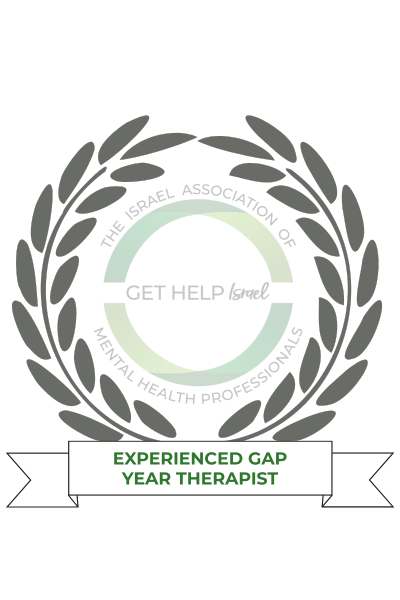Elisheva Gewirtz
Credentials
Finances
Licensed Abroad
- Menahem Usishkin, Rechavia
- Jerusalem, 94542
- Email Me
-
 Business HoursEveningsFridays/Weekends
Business HoursEveningsFridays/Weekends
Elisheva Gewirtz
 Verified
Verified
Credentials
Psychotherapist
PsyD, MA
Finances
500 NIS NIS
N/A
Sliding Scale | Free Consultation | Student Discount
ABOUT THE THERAPIST
Navigating life's challenges can be overwhelming. You may be experiencing difficulty transitioning to adulthood, overcoming childhood traumas, navigating family difficulties, struggling with dating and marriage, or making career decisions. Stress might be holding you back from living life to its fullest. If you're seeking help with these issues and aiming for a more meaningful, fulfilling life filled with presence and joy-not just a life that's less bad-I am here to work with you.
I have devoted my career to working with young adults struggling with a variety of mental health concerns including anxiety disorders, stress, depression, trauma, relationship distress, and OCD. I employ an integrative approach, utilizing cognitive behavioral therapies (including ACT and DBT) while incorporating attachment approaches and somatic experiencing into my work as well.
At the heart of my approach is a deep commitment to understanding the unique experiences, needs, and goals of each client. I tailor my approach to individual preferences, aiming to enhance your quality of life. Beyond coping with stress, anxiety, and depression, my vision is to empower you to lead a more fulfilling life with joy and meaning.
QUALIFICATIONS
PsyD
Hofstra University
2022
MA
Hofstra University
2019
Degree
PsyDEducation
Hofstra UniversityYear of Graduation
2022Degree
MAEducation
Hofstra UniversityYear of Graduation
2019Years in Practice
5
LICENSED IN THE USA
DISTANCE COUNSELING
Telephone Counseling, Online Therapy
PRIMARY SPECIALTIES
Anxiety / Panic
Depression
Life Transitions
Trauma / Post Traumatic Stress Disorder PTSD
Chronic Pain
ADDITIONAL SPECIALTIES
Adjustments
Anger Management
Dissociative Disorders
Family Issues
Grief
Mood Disorders
Obsessive Compulsive Disorder (OCD)
Postpartum Depression
Self-Esteem
Sexual Abuse / Rape
Stress Management
Religious OCD
CLIENT FOCUS
Population
Adults
Men
Women
Young Adults
Languages Spoken
English
Native Language
English
TREATMENT APPROACH
Acceptance and Commitment Therapy (ACT)Acceptance and Commitment Therapy (ACT) is a form of psychotherapy that encourages individuals to accept their thoughts, feelings, and experiences without judgment and to use them as tools to help them to make changes in their lives that are consistent with their values. It is based on the idea that by changing the way we think about our inner experiences, we can reduce emotional distress and increase our sense of well-being.
Cognitive Behavioral Therapy (CBT)Cognitive Behavioral Therapy (CBT) is a type of psychotherapy that focuses on how one's thoughts, feelings and behaviors are connected and can be changed. It is based on the idea that how we think (cognition) and how we feel (emotion) can influence how we behave. CBT helps people identify and challenge distorted thinking and replace it with more balanced thinking, leading to improved mood and behavior. ‘Homework’, usually containing practical writing exercises, is often completed by the client between sessions to reinforce the therapy. Examples of tools that practitioners often use are journaling, challenging beliefs, and mindfulness.
Cognitive Processing TherapyCognitive Processing Therapy is used to treat trauma and PTSD. During therapy, clients identify and understand their beliefs about their responses to their trauma. Inspecting their beliefs often leads clients to understand their emotions and thoughts in relation to the trauma. When the client is ready, practitioners give them tools to challenge their thoughts of the trauma as well as provide homework to solidify what they learned in sessions. In the later stages of therapy, practitioners teach clients how belief systems (about safety, self-esteem, trust, intimate relationships, control, and power) can change after trauma.
Compassion-Focused Therapy (CFT)Compassion-Focused Therapy (CFT) is an integrative psychological approach that focuses on building compassion for oneself and others. It combines elements of cognitive behavioral therapy, evolutionary psychology, philosophy, and Eastern contemplative traditions. CFT is based on the concept that compassion is a fundamental human emotion that can be cultivated to promote psychological well-being. The goal of CFT is to help individuals understand and relate to their emotions in a compassionate and non-judgmental way. It encourages clients to develop a sense of self-compassion and understanding, and to use it to create healthier ways of living. CFT also emphasizes developing a compassionate relationship with others, and can help foster greater acceptance and understanding. The primary therapeutic technique of CFT is compassionate mind training (CMT). Some CMT tools that clients may participate in are appreciation exercises, mindfulness, and compassion-focused imagery exercises. These exercises promote compassionate motivation, sympathy, sensitivity, and distress tolerance within clients.
Dialectical Behavior Therapy (DBT)Dialectical Behavior Therapy (DBT) is a type of cognitive-behavioral therapy developed by Marsha Linehan to help people learn to better manage and cope with emotions and stress. It focuses on developing skills and strategies to help regulate emotions, improve relationships and communication, and reduce self-destructive behaviors. Through DBT, people learn to identify and modify unhealthy thoughts and behaviors, while also learning to accept and validate their own feelings. DBT teaches skills to help individuals become aware of and accept and regulate their emotions, tolerate distress, and improve interpersonal relationships.
Somatic Experiencing (SE)Somatic Experiencing (SE) is a body-oriented approach to the healing of trauma and other physical and psychological stresses. It is based on the idea that the body is a powerful source of healing and that unresolved trauma can be resolved through the process of bringing awareness and attention to the physical sensations of the body. By gradually and gently guiding individuals through the sensations associated with their traumatic experience, SE can help to restore balance and well-being more quickly and effectively than traditional psychotherapy. SE utilizes the body’s natural ability to regulate and heal itself and supports individuals in developing more resilience and self-regulation. Somatic Experiencing aims to help people move past the place where they might be “stuck” in processing a traumatic event. SE is often used to treat symptoms of post-traumatic stress disorder (PTSD), anxiety, depression, and other mental health issues.
SERVICES OFFERED
Individual Therapy
Group Therapy

Therapist's Experience with Gap Year Students
My goal is to assist individuals during their gap year, addressing specific issues to help them develop the resilience and skills needed to navigate the complexities of adulthood.

 Verified
Verified


